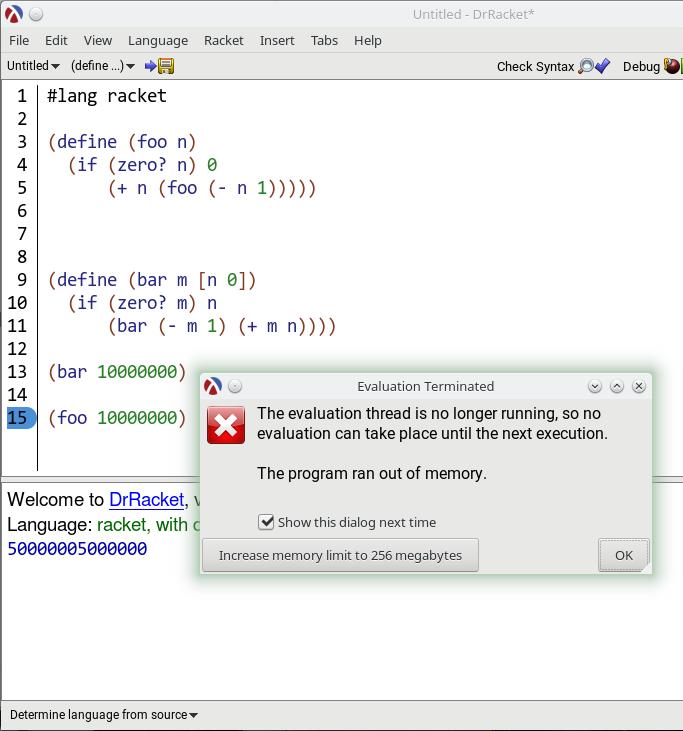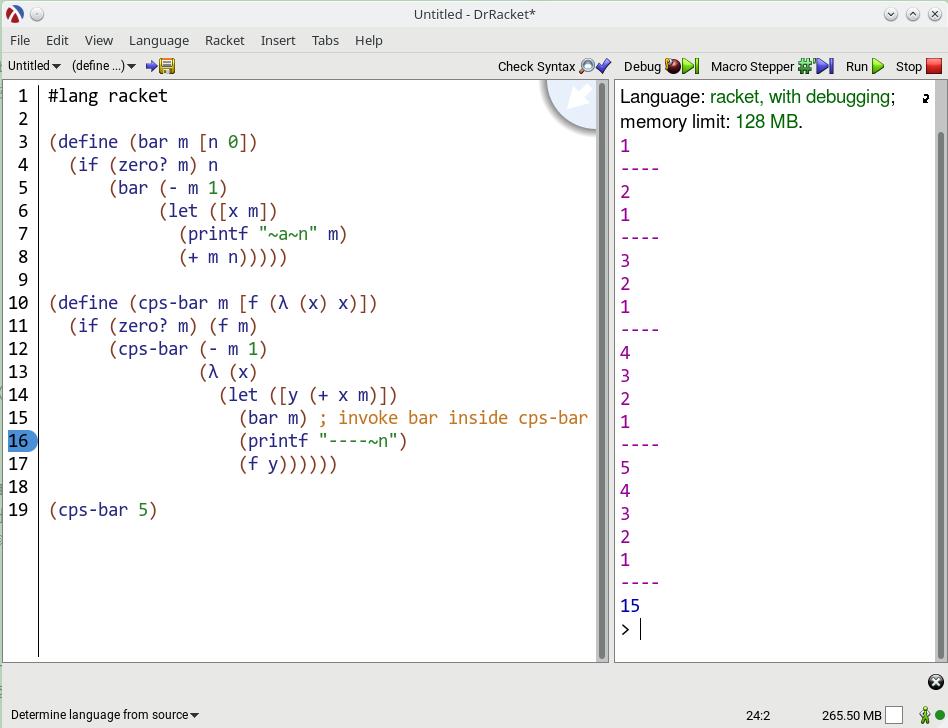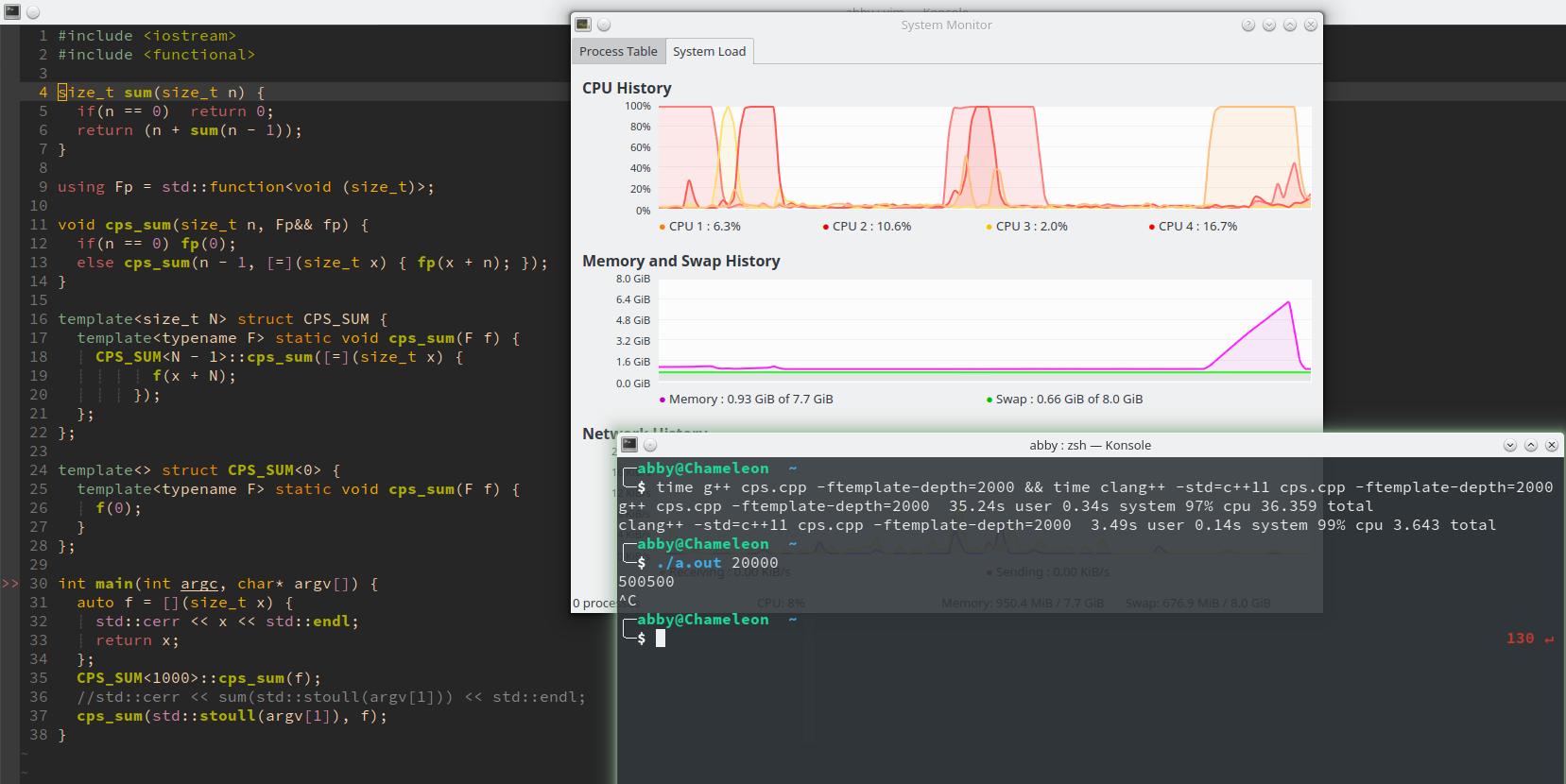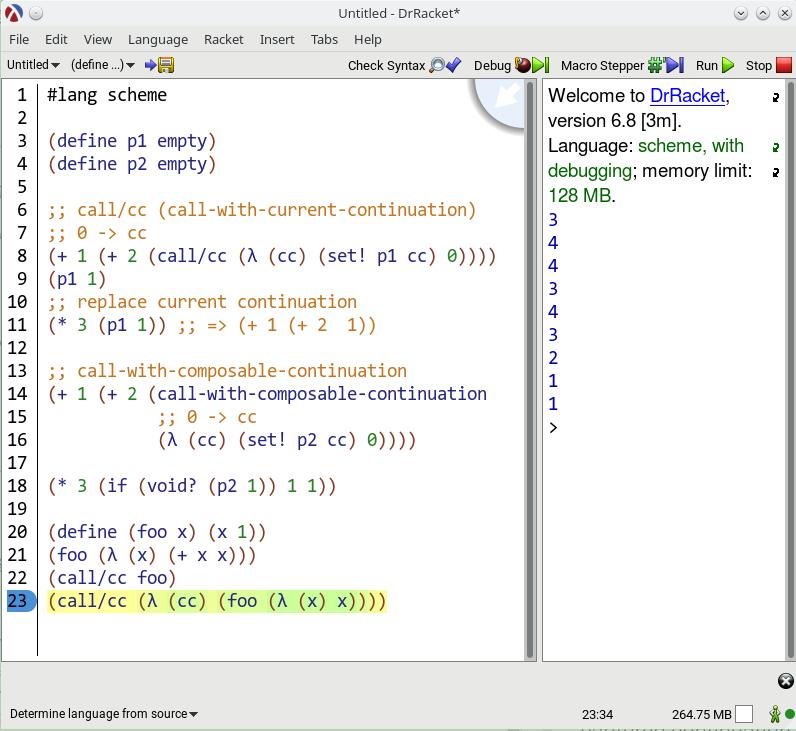CPS
CPS
什么是递归?
(define (foo n)
(if (zero? n) 0
(+ n (foo (- n 1)))))
(foo 5) ; print 15
什么是尾递归?
(define (bar m [n 0])
(if (zero? m) n
(bar (- m 1) (+ m n))))
(bar 5) ; print 15
那么有什么不同呢?请看下面的图片。

如你所见,foo的调用达到了内存限制。那么区别在哪儿呢?
显然两个函数都是自己在调用自己,不同的是foo调用自己的时候还附带了一份n而这个n需要压入栈中保存起来,而bar在调用后没有任何需要保存的东西,原来的这个栈帧就可以进行复用(这个过程称为tail call elimination)。
当然,这里的两个递归都是用函数式语言编写的,如果换成其他语言比如C/C++,并且不开优化的话第二个就算尾递归也一样会造成栈溢出。
什么是CPS?
#lang racket
(define (foo n)
(if (zero? n) 0
(+ n (foo (- n 1)))))
(define (cps-foo n [f (λ (x) x)])
(if (zero? n) (f n)
(cps-foo (- n 1) (λ (x) (f (+ x n))))))
(cps-foo 5) ; print 15
对比一下foo和cps-foo以及前面的bar的话,会发现所谓的CPS就是把一个朴素的递归变成了尾递归,那么这是不是说我们再传入一个很大的值的时候也和bar一样不会出现栈溢出了呢?
先看看尾递归的CPS版本
#lang racket
(define (bar m [n 0])
(if (zero? m) n
(bar (- m 1) (+ m n))))
(define (cps-bar m [f (λ (x) x)])
(if (zero? m) (f m)
(cps-bar (- m 1) (λ (x) (f (+ x m))))))
(cps-bar 5) ; print 15
咋一看,和前面的foo-cps没啥区别,再仔细一看,发现这两个是一摸一样的!那么会出现栈溢出吗?
不会,虽然不会出现栈溢出了,但是却会出现OOM!因为,虽然尾递归优化掉了,但是递归过程中的创建lambda会不断地消耗内存,直到计算结束或者内存耗尽。
那么,这个CPS有啥用呢?
CPS全称Continuation Passing Style,很明显这是一种风格。再结合上面的例子,可以想象CPS的递归就是把一个一个的递归个连接起来,就像一条链一环扣着一环。对上面的例子来说,通过CPS变换,我们可以将递归的过程(节点)暴露出来,这样我们就可以对这些过程做一些的修改了。
下面这个例子可能缺乏说服力(请看后续的call/cc)

上面说的都是函数式语言,那么C/C++呢?如果是C语言的话,我选择死亡,C++的话至少从11开始还有lambda啊!

从图里面可以看出同样一个CPS_SUM不同的编译器差距还真大!再看看内存使用,若不是及时的发送SIGINT就导致内存耗尽了!
call/cc
call/cc 在scheme中是call-with-current-continuation的一个binding。所以,你又见到了这个词continuation,这到底是个啥?
举个例子:
(+ 1 (+ 1 1))
;; 这个表达式的演算过程是这样的
(+ 1 (+ 1 1)) -> (+ 1 2) -> 3
可以发现上面的表达式可以分成两个部分: redex和continuation,这里redex指的是当前演算的部分(+ 1 1),而continuation指的是接下来要演算的部分(+ 1 _)这里_指代前面的redex,所以continuation表达的是“在得到redex演算的值后怎么继续”。
A continuation is a value that encapsulates a piece of an expression’s evaluation context.
下面是几个例子:
(define (foo x)
(x 1)
2)
(foo (λ (x) x)) ;; print 2
(call/cc foo) ;; print 1
如你所见,这里面出现了call/cc,毫无疑问,第一个foo的调用打印出2, 但是怎么第二个就打印出1呢?先不做解释,接着看下面这个例子
(define point empty)
(+ 1 (+ 2 (call/cc (λ (cc) (set! point cc) 0)))) ;; print 3
(point 1) ;; print 4
(* 2 (* 3 (point 1))) ;; print 4
好了,又出现奇怪的问题了是不是?下面是call/cc的定义
(call/cc proc [prompt-tag]) → any
proc : (continuation? . -> . any)
prompt-tag : continuation-prompt-tag?
= (default-continuation-prompt-tag)
可以看到call/cc不止接受一个参数,它还有一个默认的参数prompt-tag且这个参数的默认值是(default-continuation-prompt-tag)的返回值。
首先来说说为什么第二个foo的调用打印出了1,这是因为完整的调用是这样
(call/cc foo (default-continuation-prompt-tag))
从call/cc的定义里面可以看出第一个参数是一个procedure也就是这里的foo,这个foo接受一个参数,这个参数在本次调用中是一个continuation这个continuation在(x 1)处被调用,参数是1,然后就不再继续了。为什么不再继续了呢? 看第二个例子的最后一个表达式
;; 认为应该是这样
(* 2 (* 3 (point 1))) -> (*2 (* 3 4)) -> (* 2 12) -> 24
;; 事实是这样
(* 2 (* 3 (point 1))) -> (point 1) -> 4
原本的continuation被point个替换了,所以不再继续演算。这是call/cc的特性
If the continuation argument to proc is ever applied, then it removes the portion of the current continuation up to the nearest prompt tagged by prompt-tag (not including the prompt; if no such prompt exists, the exn:fail:contract:continuation exception is raised), or up to the nearest continuation frame (if any) shared by the current and captured continuations—whichever is first. While removing continuation frames, dynamic-wind post-thunks are executed. Finally, the (unshared portion of the) captured continuation is appended to the remaining continuation, applying dynamic-wind pre-thunks.
 图中出现的
图中出现的call-with-composable-continuation有一点与call/cc不同,那就是它不会替换掉当前的continuation,其中(p2 1)会打印出4。
简单来讲,call/cc就是把某个continuation做个快照(这个快照包含了此时的上下文),你可以把这个快照保持起来做一些奇怪的事,比如:
生成器
;; [LISTOF X] -> ( -> X u 'you-fell-off-the-end)
(define (generate-one-element-at-a-time lst)
;; Hand the next item from a-list to "return" or an end-of-list marker
(define (control-state return)
(for-each
(λ (element)
(set! return (call/cc
(λ (resume-here)
;; Grab the current continuation
(set! control-state resume-here)
(return element)))))
lst)
(return 'you-fell-off-the-end))
;; (-> X u 'you-fell-off-the-end)
;; This is the actual generator, producing one item from a-list at a time
(define (generator)
(call-with-current-continuation control-state))
;; Return the generator
generator)
(define generate-digit
(generate-one-element-at-a-time '(0 1 2)))
(generate-digit) ;; 0
(generate-digit) ;; 1
(generate-digit) ;; 2
(generate-digit) ;; you-fell-off-the-end
context 切换 (co-routine)
#lang racket
(require data/queue)
(define q (make-queue))
(define (fork)
(display "forking\n")
(call/cc
(λ (cc)
(enqueue! q (λ ()
(cc #f)))
(cc #t))))
(define (context-switch)
(display "context switching\n")
(call/cc
(λ (cc)
(enqueue! q
(λ ()
(cc 'nothing)))
((dequeue! q)))))
#|
(define (end-process)
(display "ending process\n")
(let ((proc (dequeue! q)))
(if (eq? proc 'queue-empty)
(display "all processes terminated\n")
(proc))))
|#
(define (end-process)
(display "ending process\n")
(let ([over (queue-empty? q)]
[proc (dequeue! q)])
(if (eq? over #t)
(display "all processes terminated\n")
(proc))))
(define (test-cs)
(display "entering test\n")
(cond
[(fork) (cond
[(fork) (display "process 1\n")
(context-switch)
(display "process 1 again\n")]
[else (display "process 2\n")
(end-process)
(display "you shouldn't see this (2)")])]
[else (cond [(fork) (display "process 3\n")
(display "process 3 again\n")
(context-switch)]
[else (display "process 4\n")])]))
(test-cs)
(context-switch)
(display "ending process\n")
(end-process)
(display "process ended (should only see this once)\n")
此代码是来自stack overflow经过简单修改后的可运行的版本,输出和SO给出的输出不同。
参考及引用
cps Wikipedia
by exmpale continuation passing style
王垠的「40 行代码」真如他说的那么厉害吗?
Guid Continuation
Reference Continuation
Eval-model 1.1.1 && 1.1.12
call/cc - Wikipedia
context switch